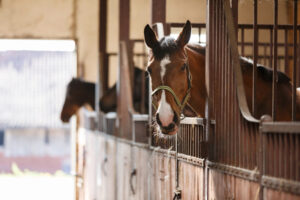
Horses Moved to Individual Stabling Show Stress-Related Changes
By Mark Andrews
Horses moved from group housing to individual stabling showed stress-related changes, recent research has found.
The horses had shifts in their white blood cell counts typical of a stress response and higher levels of plasma cortisol. These changes could make them more vulnerable to infectious disease.
In the study, conducted at the University of Hohenheim in Stuttgart, Germany, Sonja Schmucker and colleagues followed a group of twelve horses through a series of management changes, and monitored alterations in their immune response and behaviour. The research is published in PLOS ONE.
Twelve warmblood geldings, aged 2-3 years old, completed the study. Before the start of the investigation, they had been living together in a group on pasture.
In the first phase of the study, the horses were divided into two groups, each maintained on two separate paddocks so that horses in one group could not see the others. After the eight days trial period both groups were returned to their original setting.
After a further eight weeks on pasture, the horses entered the second part of the study. They were moved to individual stables, where they were able to see and touch their neighbours through barred windows. For the first week after housing, horses were allowed 30 minutes daily exercise in groups of 6 in an indoor area of the stable. From the second week onwards, the horses were exercised by lunging.
The research team collected blood samples for analysis of immune cell numbers and cortisol concentrations from all animals on days 1 and 8 after both changes in housing conditions. In addition, in the stabled group they collected samples 7 and 6 days before, and again immediately before, the beginning of the stabling phase.
They found that moving to individual stabling led to acute stress-induced immune changes but dividing the larger group into two smaller ones did not.
“The number of eosinophils, monocytes and T cells declined, whereas the number of neutrophils increased resulting in an increased N:L ratio. This pattern of change resembles the well-known picture of an immunomodulation induced by acute social stress.”
Plasma cortisol concentrations did not change after dividing the pasture group into two smaller groups However, moving the horses to individual stables was associated with an increase in cortisol concentrations one day after housing which had returned to previous levels after eight days.
The researchers report “Although cortisol concentrations returned to baseline level after 8 days, the alterations in most immune cell numbers persisted, pointing to a longer-lasting effect on the immune system of the horses.”
They also monitored the horses’ behaviour during the study and noticed that signs of stereotypical behaviour started to appear amongst the housed animals.
The authors conclude “relocation to individual stabling represented an intense stressor for the horses of the present study, leading to acute and lasting alterations in blood counts of various leukocyte types. In contrast, fission of the stable group did not result in behavioral, endocrine or immunological stress responses by the horses.”
“The results of the present study therefore strongly indicate that social isolation is a chronic stressor with negative impact on welfare and health of horses and highlight the advantage of group housing systems in view of immunocompetence.”
For more details, see:
Schmucker S, Preisler V, Marr I, Krüger K, Stefanski V (2022)
Single housing but not changes in group composition causes stress-related immunomodulations in horses. PLoS ONE 17(8): e0272445.

Recently Added
- Around the Rings – The Big A 2025 with the G-Man July 3, 2025
- Hes Golden July 3, 2025
- Around the Rings Candid Photos – 2025 APHA World Show July 3, 2025
- EC Photo of the Day – APHA World Show 2019 July 3, 2025
- From The Publisher – More Than Ribbons: Life Lessons From The Barn July 3, 2025
- Pamela Switzer Delivers One-Two Punch in Masters Western Riding July 2, 2025
- More Around the Rings – 2025 AQHA Region 5 and NJ Youth QH Show July 2, 2025
- Around the Rings – The Big A 2025 with the G-Man July 2, 2025
- Around the Rings – 2025 AQHA Region 5 and NJ Youth QH Show July 2, 2025
- EC Photo of the Day – APHA World Show 2018 July 2, 2025
Sign In
Equine Chronicle ® All Rights Reserved. Copyright © 2025
4727 NW 80th Ave. • Ocala, FL 34482 • 352 369 1104 • FAX 352 369 1521
Privacy Policy | Questions, please contact The Equine Chronicle
-









